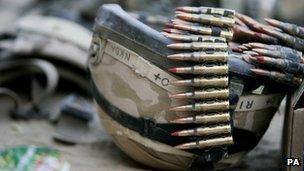Oxfam: Sale of ammunition 'must be regulated'
- Published

Oxfam says 12 billion bullets are produced each year - almost two for every person in the world
Humanitarian charity Oxfam has launched a new campaign to call for the regulation of the sale of ammunition around the world.
It comes ahead of a United Nations summit in July on bringing in a new arms trade treaty to regulate the sale of arms.
Oxfam is arguing that any treaty must also regulate ammunition trade or the treaty "doesn't make sense".
But a number of nations, including the US and China, oppose such a move.
Egypt, Syria, Russia, Iran, Venezuela and several other countries are also against including ammunition trade in any final treaty, arguing that it will be too difficult to monitor.
'Fuel of conflict'
In a new report, Oxfam found that the global ammunitions industry for small arms and light weapons is worth $4.3bn (£2.78bn), much more than the trade in the weapons themselves, with 12 billion bullets produced a year.
Anna Macdonald, head of arms control at the charity, said: "A gun without a bullet is a very large metal stick, basically. Ammunition is literally the fuel of conflict.
"The trade in ammunition is lucrative, but while the monetary cost of production is low, the price paid in human lives for the trade in ammunition is incalculable."
The parameters of the new treaty, if is is passed, will be worked at a month-long UN conference in July between arms companies, governments and aid agencies.
A draft treaty which would ban all weapons sales to countries that fail to meet various human rights criteria has already been provisionally agreed to by 153 counties.
The aim is for it to bring various international laws governing the sale of arms into one legally-binding treaty.
- Published24 May 2012
- Published13 February 2012
- Published7 June 2011
- Published11 May 2012
- Published19 March 2012
- Published22 February 2011
- Published29 October 2011